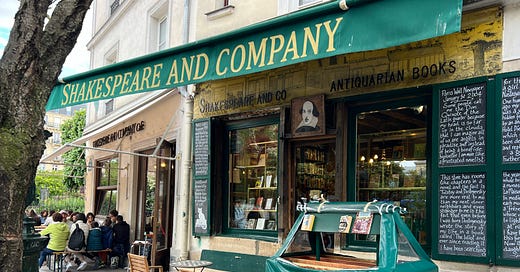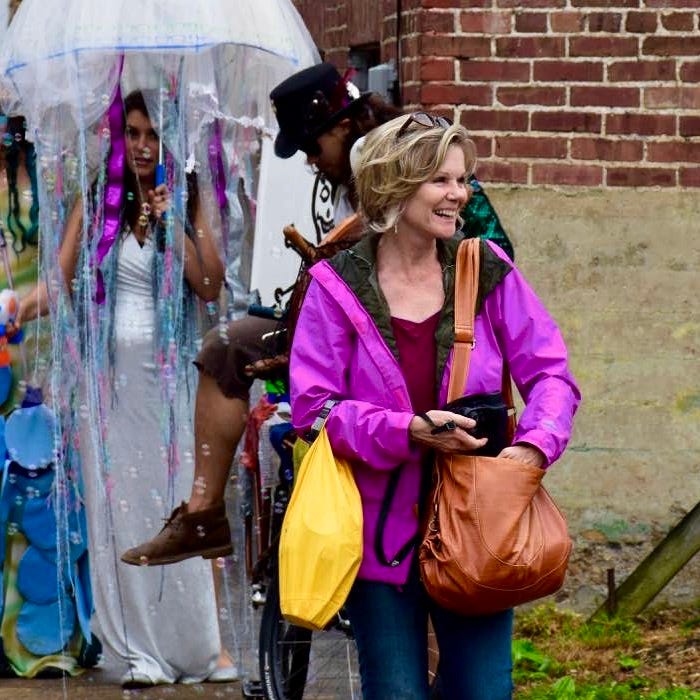Both of my own film attempts only added to my empathy and visceral understanding of what each filmmaker went through to make their own films – from conceptualization to fundraising to shoots to writing to editing and release out into the world. As my efforts on A Woman Named Hello began to falter, I returned to helping others with their own documentaries.
Fortunately, Where Words Prevail soon came my way – an inspiring documentary about the life and work of Dame Cis Berry, a British legend.
Growing up, Cis often hid in her working-class family’s bathroom to read Shakespeare, Keats, Shelley and Auden to her dog, Micky. Eventually, she studied and scrabbled and improvised and worked her way to becoming the Royal Shakespeare Company’s voice director – the first female in that role, and a position she held for nearly half a century.
Over the course of her long career, she influenced the stage and screen performances of generations of British actors, including Sean Connery (whom she coached at her home in the 1960s prior to joining the R.S.C.), Judi Dench, Emily Watson, Patrick Stewart, and Ian McKellen.
What Cis understood was the music of Shakespeare. Her unorthodox exercises released actors’ minds “to feel the sound and muscularity of Shakespeare’s verse.”
“Her personal approach was almost that of a confidante, relaxing the mind and the body, or of a healer soothing tensions, rooting emotions in reality,” McKlennen said in a 1976 interview. “She prepared the actor to be a tuned instrument, which may clearly and resonantly play Shakespeare’s subtlest and grandest notes.”
Cis also took her lessons on the road. Where Words Prevail documented her efforts to teach the power of voice, language and communication to workshops and classes in Seoul, prison inmates in Moscow, to impoverished barrio residents in Rio de Janeiro.
The title of the documentary – Where Words Prevail – triggered a memory of sitting in the kitchen of the house Martin and I bought in the Money Pit neighborhood, and how those four little words he said – I’ve changed my mind – had prevailed, changing my life’s direction completely.
Well, almost completely; I was still working with documentary films, but now I was my own boss. Looking back on that moment, I realized how at peace I was with how everything went from that moment on. Actually, more than at peace. It was like looking underneath the bandage and seeing what you once thought was a life-threatening wound has not only miraculously healed, but your skin looks better than you ever thought it could.
As usual, I was hired to do what I had come to call ‘PBS station wrangling’ – getting Where Words Prevail on the air on as many of the 349 PBS stations across the US as possible, a task I compared to the effort involved trying to get a film accepted into as many film festivals as possible – and simultaneously. People who have tried to do this will understand what I mean.
New York City filmmakers Steve Budlong and Salvatore Rasa wanted to have their film air on WNET, New York City’s PBS station, and in prime time. Of course, they did; it’s the holy grail for everyone, especially if New York is where you live and work.
For many reasons, however, this was a difficult ask. If you were to line everyone up at the same time, the filmmakers and producers trying to get their film on WNET – the biggest PBS station in the entire country – would likely stretch all the way to Los Angeles.
WNET produces a lot of PBS programming themselves, and their in-house programs get top priority. Then there are the demands and expectations from PBS, the mother ship itself, whose national program schedule takes up all but one of the prime-time hours each week. And to get that one slot, your film has to be incredibly meaningful to the New York audience.
I knew I needed to come up with a different kind of approach. Uppermost in my thoughts, as always, was to figure out a way to give something first to WNET, before asking for anything of them on behalf of my filmmaker clients.
Fortunately, we had a major ace up our sleeves.
Steve Budlong worked at Citicorp, having been hired in 1990 to create their in-house Media Center, an impressive complex of studios and post-production suites. When Citicorp morphed into CitiGroup, Steve was producing programs as well as major international events and working with hundreds of celebrities, world leaders and CEOs, including Presidents Gerald Ford, George H. W. Bush, and Bill Clinton.
Steve’s boss was Citigroup chief executive and chairman banker, Sandy Weill. In addition to being a prominent businessman, Weill and his wife were also major philanthropists, making over one billion in gifts to educational and cultural institutions. One recipient was the Joan Weill Center for Dance, Alvin Ailey’s12-studio complex, which had just opened in 2005 and was the largest building dedicated to dance in New York City.
Steve, Sal and I brainstormed and came up with the idea of offering WNET a private screening event inside the brand-new Alvin Ailey Studios of Where Words Prevail for their top tier supporters.
As serendipity would have it, the Ailey studios are located on West 55th Street in midtown Manhattan on the site of WNET’s former studios, where the Ailey Company's first television appearance took place in the early 1960s. They were a perfect match.
When I initially pitched WNET’s programming team the idea of doing this, I made it clear that it was a package deal. We (meaning Steve) would handle the costs and labor of the entire event, but only if Where Words Prevail was given a prime-time airdate on their main station. Okay, they responded, but only if I did all the work, including getting the invitations out to their top one thousand donors.
“That’s fine,” I said. “Give me all their names, addresses and phone numbers, and I’ll address the invitations myself.”
There was a pause on the other end of the line as they processed the idea of sending me that precious information.
“On second thought,” came the response a moment later. “Send the invitations to us, we’ll handle getting them to our donors.”
This was also a good opportunity for Bill Baker, WNET’s general manager, my executive producer on American Byzantine, and the man who’d hired me for The Face: Jesus in Art. I was happy this film gave me the opportunity to give back something for his support over the years, support that had launched my freelance career.
Working on Where Words Prevail was challenging, demanding and difficult, but also a lot of fun. For the other 348 PBS stations around the country, I created a competition. To get programmers in the mood for a documentary that featured the Royal Shakespeare Company’s voice coach, I wrote my own sonnet about Where Words Prevail, based upon Romeo & Juliette. In it, I embedded 14 quotes from Shakespeare and sent it out to everyone via email. The first dozen responding with correct answers would receive a copy of the book written and autographed by Cis Berry to use as a prize.
It worked a charm and within a few hours I had my winners – as well as a lot of attention for the film.
Steve and Sal flew Dame Cis Berry over from England. On the night of the premiere, WNET’s top tier supporters filled the theater. They enjoyed the film and appreciated Cis’s rags-to-Shakespeare story. The daughter of a city clerk and a dressmaker in a little town northwest of London, she still had the accent and vernacular of her humble beginnings – when she wasn’t reciting Shakespeare.
After the screening there was an audience Q&A. In what The New York Times would later characterize as “a soothing but commanding voice … leavened with profanity,” Cis shared the story of the early years of her career. When someone from the audience asked her why she’d taken on certain work, she shrugged and responded simply, “Because we needed to pay the ‘effing electric bill!”
That was something I could well relate to, but probably not many others in this posh crowd. There was a moment of stunned silence, then an appreciative roar of laughter. They loved her.
WNET was delighted with the event, Sal and Steve were delighted with the turnout and reaction, and Cis was delighted to share her work and words with hundreds of appreciative New Yorkers.
With WNET’s prime time airdate setting the pace, PBS stations across the country followed suit and aired the story of Dame Cis Berry nearly five thousand times. In the days before the multi-channel universe, that was a lot of broadcasts.
Steve Budlong was one of the sweetest and most supportive producers I had ever worked with. He was also an avid collector of poster art.
“Pop Culture is really a love of mine,” he once wrote to me. “Putting all those little bits and moments together that somehow build a collective conscience.”
We stayed in touch the rest of his life, sharing ideas for documentaries, contacts and life wisdom. Steve is the only filmmaker who actually paid me more than the amount I was contracted for.
“This is not a tipping profession,” I protested, but he told me to keep it and do something nice for myself.
I decided to buy myself a kayak for my new life in the Blue Ridge Mountains.
[photograph of Shakespeare & Company taken by me, Paris 2024]
Kristin Fellows is a published writer, world traveler, and a well-seasoned documentary film consultant. When not writing, Kristin can often be found listening to someone’s story or behind the lens of one of her cameras.
More about Kristin @ kristinfellowswriter.com






You are effing Amazing…!